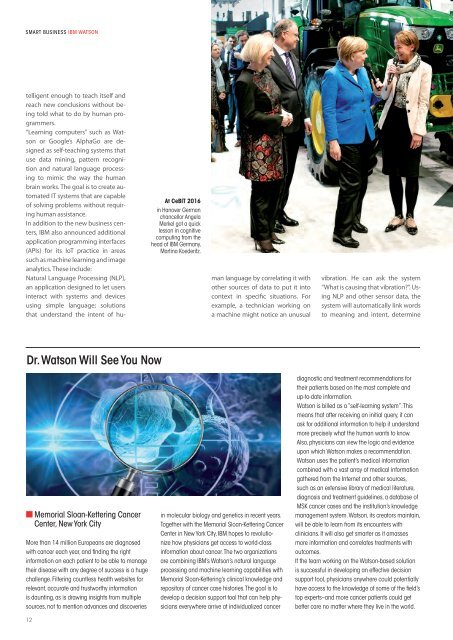Smart Industry 1/2016
Smart Industry 1/2016 - The IoT Business Magazine - powered by Avnet Silica
Smart Industry 1/2016 - The IoT Business Magazine - powered by Avnet Silica
Create successful ePaper yourself
Turn your PDF publications into a flip-book with our unique Google optimized e-Paper software.
<strong>Smart</strong> Business IBM Watson<br />
At CeBIT <strong>2016</strong><br />
in Hanover German<br />
chancellor Angela<br />
Merkel got a quick<br />
lesson in cognitive<br />
computing from the<br />
head of IBM Germany,<br />
Martina Koederitz.<br />
telligent enough to teach itself and<br />
reach new conclusions without being<br />
told what to do by human programmers.<br />
“Learning computers” such as Watson<br />
or Google’s AlphaGo are designed<br />
as self-teaching systems that<br />
use data mining, pattern recognition<br />
and natural language processing<br />
to mimic the way the human<br />
brain works. The goal is to create automated<br />
IT systems that are capable<br />
of solving problems without requiring<br />
human assistance.<br />
In addition to the new business centers,<br />
IBM also announced additional<br />
application programming interfaces<br />
(APIs) for its IoT practice in areas<br />
such as machine learning and image<br />
analytics. These include:<br />
Natural Language Processing (NLP),<br />
an application designed to let users<br />
interact with systems and devices<br />
using simple language; solutions<br />
that understand the intent of human<br />
language by correlating it with<br />
other sources of data to put it into<br />
context in specific situations. For<br />
example, a technician working on<br />
a machine might notice an unusual<br />
vibration. He can ask the system<br />
“What is causing that vibration?”. Using<br />
NLP and other sensor data, the<br />
system will automatically link words<br />
to meaning and intent, determine<br />
Dr. Watson Will See You Now<br />
■ Memorial Sloan-Kettering Cancer<br />
Center, New York City<br />
More than 14 million Europeans are diagnosed<br />
with cancer each year, and finding the right<br />
information on each patient to be able to manage<br />
their disease with any degree of success is a huge<br />
challenge. Filtering countless health websites for<br />
relevant, accurate and trustworthy information<br />
is daunting, as is drawing insights from multiple<br />
sources, not to mention advances and discoveries<br />
12<br />
in molecular biology and genetics in recent years.<br />
Together with the Memorial Sloan-Kettering Cancer<br />
Center in New York City, IBM hopes to revolutionize<br />
how physicians get access to world-class<br />
information about cancer. The two organizations<br />
are combining IBM’s Watson’s natural language<br />
processing and machine learning capabilities with<br />
Memorial Sloan-Kettering’s clinical knowledge and<br />
repository of cancer case histories. The goal is to<br />
develop a decision support tool that can help physicians<br />
everywhere arrive at individualized cancer<br />
diagnostic and treatment recommendations for<br />
their patients based on the most complete and<br />
up-to-date information.<br />
Watson is billed as a “self-learning system”. This<br />
means that after receiving an initial query, it can<br />
ask for additional information to help it understand<br />
more precisely what the human wants to know.<br />
Also, physicians can view the logic and evidence<br />
upon which Watson makes a recommendation.<br />
Watson uses the patient’s medical information<br />
combined with a vast array of medical information<br />
gathered from the Internet and other sources,<br />
such as an extensive library of medical literature,<br />
diagnosis and treatment guidelines, a database of<br />
MSK cancer cases and the institution’s knowledge<br />
management system. Watson, its creators maintain,<br />
will be able to learn from its encounters with<br />
clinicians. It will also get smarter as it amasses<br />
more information and correlates treatments with<br />
outcomes.<br />
If the team working on the Watson-based solution<br />
is successful in developing an effective decision<br />
support tool, physicians anywhere could potentially<br />
have access to the knowledge of some of the field’s<br />
top experts–and more cancer patients could get<br />
better care no matter where they live in the world.

















